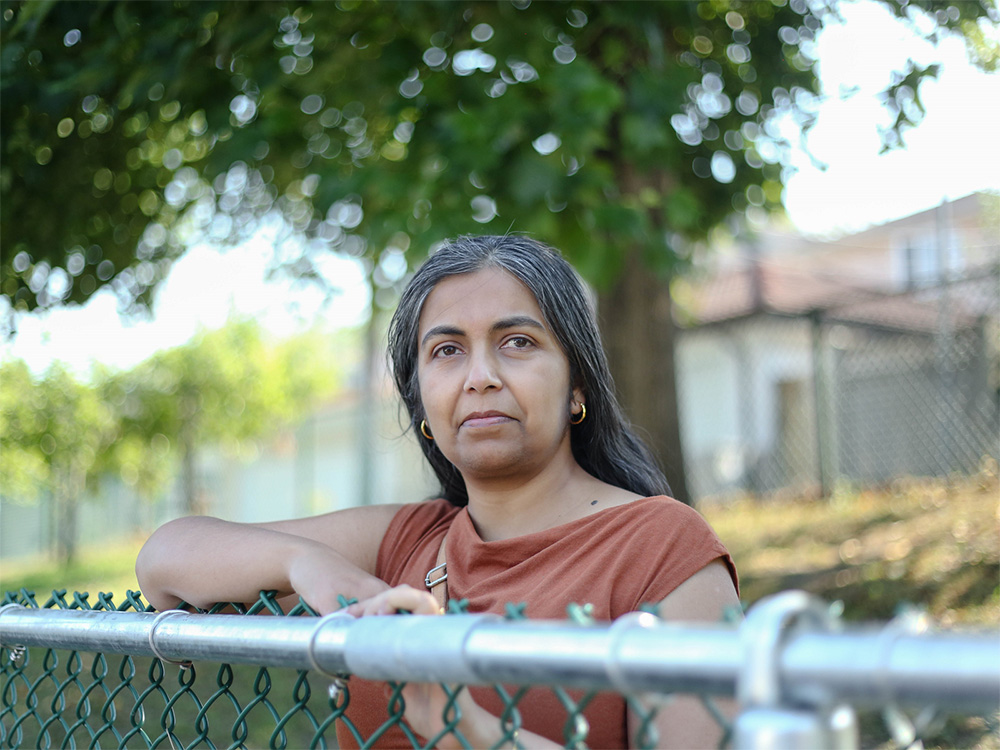Among other things, I am Brown and a teacher on call. While those two things do not feature prominently in the constellations of my personal identity, they’re what are immediately visible when I walk into any classroom.
As a teacher on call, I am in a different school with different sets of staff and students throughout the school year. As a teacher on call, I am, as staff and students sometimes remind me, “not the real teacher.” The Brown sometimes inspires fake Indian accents, usually at the back of the classrooms, by students whose names I do not know. While not teaching and at the park with my own children, I am sometimes mistaken for my children’s nanny. My children take after my husband and my brown skin smacks of the imposter parent.
In the early 1990s, my family immigrated from India. My father is a military engineer with 35 years of service and my mother was a teacher with a MA in English literature. Their qualifications are valueless in Canada. They took the jobs available because their children needed food and a roof over their heads. They kept their jobs as clerks at convenience stores where they too were reminded of their imposter status in society. Their colour of skin was pointed out by disgruntled customers.
Sometimes I am met by a parent of a student at the classroom door, clearly worried. They say that they’d hoped their child’s teacher would be fluent in English. I tell them that I feel competent in communicating in English. There is a pause, as there sometimes is in such conversations. Then they ask, “Why do you have a British accent?”
I sidestep the historical and colonial reasons why a person such as myself may have a British accent. Instead I busy myself doing the job that my mother was not allowed to do. I see why she loved it. I see why she treated her students in India with the same love and care as her children. Suddenly, it’s lunch time.
I am in the staff room, reaching for a cup on the shelf. “No,” says a panicked voice next to me. “Those are for staff. The guest cups are over there.” The colleague notices my lunch container and provides another crucial piece of orientation. “The microwave for spicy foods is over there,” on the other side of the staff room, away from the seating area.
I have been in staff rooms where notices on the cork board sometimes say, “No samosas for potluck lunch meeting,” and I have found myself thinking, “It’s all right, there is food that is not my favourite either.” Then I walk into another new classroom where my “Good afternoon!” is met with “I smell curry” from that one person at the back of the class. As a teacher on call, I have little recourse. My concerns are usually dismissed, and I am treated as though I may have incited the comments by my own actions.
I have taught for 14 years and heard many similar comments over that time. But I have also been welcomed; my smile has been returned. I have been offered a guided tour of the school by shy students, shown artwork in dog-eared notebooks marked “top secret” and asked at 3 p.m., as I pack my bag, “Ms. G, when are you coming back?”
When I enter a classroom, I hold the probability of a returned greeting and hearing “I smell curry” on an equal footing in my mind. I find that after 14 years, I’m feeling fatigued. An acquaintance once pointed out, “Maybe racism is just the price of being here. You are allowed to teach and that is a privilege.”
Maybe.
Some years ago, I taught in the same classroom for four months. At the end of the year, my husband and child visited my classroom as guests for the year-end party. A few days later, an Indian student who had been mostly silent over the course of the four months stood by my desk and blurted out: “Your husband is not Indian.”
Me: “No.”
Student: “So you just married him?”
Me: “Yes, I suppose.”
Student: “I think I will marry whoever I want to marry.” He walked back to his desk.
While I am apprehensive about going into new schools and classrooms, my students are watching. They watch when I ask, “Is there a reason you are speaking that way?” when met with a faux Indian accent. They notice when I query, “What does being a coconut mean?” when asked if I am one. They may not pay attention to every math lesson, but they are watching me navigate being Brown and a teacher. And that may be an important piece of orientation in their lives. ![]()
Read more: Rights + Justice, Education

















Tyee Commenting Guidelines
Comments that violate guidelines risk being deleted, and violations may result in a temporary or permanent user ban. Maintain the spirit of good conversation to stay in the discussion.
*Please note The Tyee is not a forum for spreading misinformation about COVID-19, denying its existence or minimizing its risk to public health.
Do:
Do not: